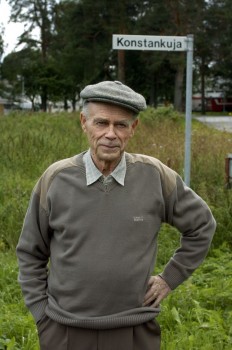Search results for "sofi oksanen/feed/www.booksfromfinland.fi/2012/04/tuomas-kyro-mielensapahoittaja-ja-ruskea-kastike-taking-offence-brown-sauce"
Tuomas Heikkilä & Liisa Suvikumpu: Suomen Turku julistaa joulurauhan. Åbo kungör julfred [Finland’s Turku announces the Christmas peace]
9 December 2011 | Mini reviews, Reviews
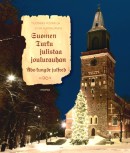 Suomen Turku julistaa joulurauhan. Åbo kungör julfred
Suomen Turku julistaa joulurauhan. Åbo kungör julfred
[Finland’s Turku announces the Christmas peace]
Swedish translation: Malena Torvalds-Westerlund
Helsinki: Kirjapaja, 2011. 71 p., ill.
ISBN 978-952-247-229-8
€ 24, hardback
This bilingual book offers a broad interpretation of a unique Christmas tradition upheld by the Finns: at 12 on Christmas Eve a large proportion of the population falls silent to listen to the declaration of the Christmas peace from Turku cathedral. After its bells have rung noon, the deputy mayor ceremonially opens a manuscript prepared according to mediaeval tradition and reads the announcement in both Finnish and Swedish. After the announcement, the land settles down to celebrate Christmas following traditions dating from the 13th century. The Christmas peace has been announced in Turku almost without interruption since the Middle Ages. The last time it went unread was in 1939, during the Winter War. The Finnish Broadcasting Company broadcasts the occasion to all the member countries of the European Broadcasting Union EBU. The Christmas peace is also sent out into the world by Swedish radio, reaching a total of some 140 countries.
Translated by Hildi Hawkins
Finnish best-sellers in Estonia
8 February 2010 | In the news
In mid-January four books out of ten on the best-sellers’ list in Estonia were translations of Finnish books: a history of Estonia by Seppo Zetterberg (Viron historia, 2007, number 1), a book on 20th-century Estonian history edited by Sofi Oksanen and Imbi Paju (Kaiken takana oli pelko, ‘Fear behind it all’, 2009, number 6), the 2008 Finlandia Prize-winning novel, set in 20th-century Estonia, by Sofi Oksanen (Puhdistus, ‘Purge’, number 7) and a new translation of the classic 1940s novel Sinuhe, egyptiläinen (English translation, Sinuhe the Egyptian) by Mika Waltari (number 10).
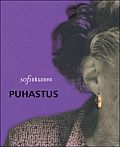 Oksanen’s novel was the second on the list of best-sellers in 2009. The list is run by Apollo bookstore chain; the largest in Estonia, it has ten shops in four cities and an internet shop. Apollo is owned by the Finnish Sanoma Trade, one of the five divisions of Sanoma Group, an European media corporation with activities in 20 countries and net sales of 3,030.1 million €.
Oksanen’s novel was the second on the list of best-sellers in 2009. The list is run by Apollo bookstore chain; the largest in Estonia, it has ten shops in four cities and an internet shop. Apollo is owned by the Finnish Sanoma Trade, one of the five divisions of Sanoma Group, an European media corporation with activities in 20 countries and net sales of 3,030.1 million €.
Just business?
24 September 2010 | Letter from the Editors

Money, money, money... Photo: Twid/Wikipedia
Through his work, a writer provides a living for both himself and his publisher. The publisher makes his profit through the work of his writers, and both parties are satisfied. Is this how it goes?
The novel Puhdistus (Purge, 2008) by the Finnish author Sofi Oksanen (born 1977) has been translated into 13 languages, including English, and by now it has sold who knows how many copies.
One would imagine her publisher would like to live happily ever after with his superstar, and perhaps also vice versa – for WSOY (est. 1878) has long been one of the most powerful, as well as the most enlightened, publishing houses in Finland. More…
In praise of idleness (and fun)
21 December 2012 | Letter from the Editors
As the days grow shorter, here in the far north, and we celebrate the midwinter solstice, Christmas and the New Year, everything begins to wind down. Even here in Helsinki, the sun barely seems to struggle over the horizon; and the raw cold of the viima wind from the Baltic makes our thoughts turn inward, to cosy evenings at home, engaging in the traditional activities of baking, making handicrafts, reading, lying on the sofa and eating to excess.
It is a time to turn to the inner self, to feed the imagination, to turn one’s back on the world of effort and achievement. To light a candle and perhaps do absolutely nothing – which can in itself be a form of meditation.
That’s what we at Books from Finland will be trying to do, anyway. Support in our endeavour comes from an unlikely quarter. In 1932 the British philosopher Bertrand Russell published an essay entitled ‘In Praise of Idleness’, in which he argued cogently for a four-hour working day. ‘I think that there is far too much work done in the world,’ he wrote; ‘that immense harm is caused by the belief that work is virtuous’.
Russell was no slouch, as his list of publications alone shows. But his argument was a serious one, and we mean to put it into practice, at least over the twelve days of Christmas. ‘The road to happiness and prosperity,’ he wrote, ‘lies in an organised diminution of work.’ More…
Time to go
29 June 2015 | Greetings
[kml_flashembed publishmethod=”static” fversion=”8.0.0″ movie=”https://booksfromfinland.fi/wp-content/uploads/2015/06/Books_Kesabanneri_2015.swf” width=”590″ height=”240″ targetclass=”flashmovie”]  [/kml_flashembed]
[/kml_flashembed]
Animation: Joonas Väänänen
We’ve often thought of editing Books from Finland as being a bit like throwing a party.
It’s our job to find a place to hold it, send out the invitations and provide the food and drink.
It’s your job to show up and enjoy.
![]()
Books from Finland is a party that’s been running since 1967 – for nearly fifty years.
In that time, we’ve served up almost 10,000 printed pages and 1,500 posts, a wide-ranging menu of the best Finnish fiction, non-fiction, plays and drama, accompanied by essays, articles, interviews and reviews.
We’ve had a ball, and to judge by the letters and emails we’ve received from many of you, you’ve had a good time too.
But now it’s time to go: the landlord, to stretch the metaphor, has called in the lease on our party venue. Faced with funding cuts in the budget of FILI – the Finnish Literature Exchange, which has since 2003 been Books from Finland’s home – the Finnish Literature Society has decided to cease publication of Books from Finland with effect 1 July 2015. Our archive will remain online at this address, and the digitisation project will continue. We won’t be adding any new material, though; this is, literally, the last post.
![]()
The party may be over, the lights and music turned off – but what about the partygoers?
They are doing what partygoers always do: they – we – are moving on.
Readers and writers, photographers and illustrators, everyone who’s helped, supported and enjoyed Books from Finland, thank you!
So long. See you around.
Hildi Hawkins & Leena Lahti
Star-Eye
31 March 1984 | Archives online, Children's books, Fiction
A story from Läsning för barn (‘Reading for children’,1884). Introduction by George C. Schoolfield
There was once a little child lying in a snowdrift. Why? Because it had been lost.
It was Christmas Eve. The old Lapp was driving his sledge through the desolate mountains, and the old Lapp woman was following him. The snow sparkled, the Northern Lights were dancing, and the stars were shining brightly in the sky. The old Lapp thought this was a splendid journey and turned round to look for his wife who was alone in her little Lapp sledge, for the reindeer could not pull more than one person at a time. The woman was holding her little child in her arms. It was wrapped in a thick, soft reindeer skin, but it was difficult for the woman to drive a sledge properly with a child in her arms.
When they had reached the top of the mountain and were just starting off downhill, they came across a pack of wolves. It was a big pack, about forty or fifty of them, such as you often see in winter in Lapland when they are on the look-out for a reindeer. Now these wolves had not managed to catch any reindeer; they were howling with hunger and straight away began to pursue the old Lapp and his wife. More…
Air, blue and gold
16 January 2014 | Fiction, poetry
Poems. Introduction by Tuula Hökkä
The arch bridge
From Ylitse vuoren lasisen (‘Over the glass mountain’, 1949)
And God said: to others I’ll give other tasks, but the task I’ll give to you
is to make a curving bridge, my child, with an arch that’s round and true.
For everywhere around the earth human beings are laden with gloom,
and they’ll come to cross an arching bridge in their anguish and their doom.
Make a bridge that spans the precipice, a bridge over the abyss,
one that shines to my glory with radiance, sparkling like this.
I said: They will come with heavy boots, and heels caked with clay –
how can my bridge withstand their weight, yet also shine this way,
not tarnish or break apart as their crowding presence nears?
And God said: well, it can only be done by means of blood and tears.
Your heart is stronger than mountain rock, the ore that’s buried there –
Put a piece of it into the bridge support, and you’ll get the bridge to bear.
Add a piece of the hearts of those you love, and I know they won’t condemn,
but will surely grant you forgiveness if you make a bridge for them.
Make a bridge to the glory of God, my child, make a bridge with arching light
that will span the depths and shine for ever, with radiance sparkling bright.
Don’t lock the sorrow out of your heart as the bridge you make appears.
Nothing gleams more beautifully than the brilliance of pure tears. More…
Translation prize to Angela Plöger
23 October 2014 | In the news
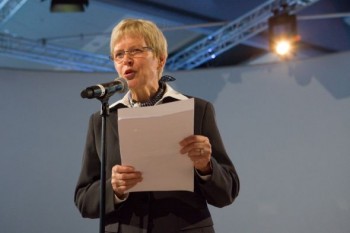
Angela Plöger, Frankfurt Book Fair, 8 October. Photo: Katja Maria Nyman
The 40th Finnish State Prize for the Translation of Finnish Literature of 2014 – worth €15,000 – was awarded to the German translator Angela Plöger at the Frankfurt Book Fair on 8 October.
Dr Angela Plöger (born 1942) studied Finnish and Fennistics in Berlin; she first came to Finland in the 1960s after having become interested in the Finnish language as a result of learning Hungarian.
‘I had been to the restaurant at the Helsinki Railway Station where Bertolt Brecht was thinking how the noblest part of a man is his passport, and how Finns are a people who keeps silent in two languages.’
Plöger then defected to West Germany, starting her career anew. She has also translated texts from Hungarian and Russian. In her speech in the Finnish Pavilion of the Book Fair Plöger said that in her opinion translating literature is the most fascinating profession in the world.
Her first translation of a Finnish novel was Tamara, by Eeva Kilpi, published in 1974. Among the most recent of the 40 novels Plöger has translated during the past five decades from Finnish are the novels Kätilö (‘Midwife’, 2011) by Katja Kettu and Kun kyyhkyset katosivat (‘When the doves disappeared’, 2012) by Sofi Oksanen. Among the other works Plöger has translated are novels by Leena Lander, Eeva-Kaarina Aronen, Anja Snellman, Kaari Utrio, Johanna Sinisalo, Risto Isomäki and Antti Tuuri, as well as a number of drama texts by Laura Ruohonen, Juha Jokela, Aki Kaurismäki, Pirkko Saisio and Sofi Oksanen.
The Minister for Culture and Housing, Pia Viitanen, thanked Plöger for her extensive and multi-faceted work in the field of language and literature and in promoting Finnish literary culture in Germany.
The prize, worth € 15,000, has been awarded by the Ministry of Education and Culture since 1975 on the basis of a recommendation by FILI – Finnish Literature Exchange.
How much did Finland read?
30 January 2014 | In the news
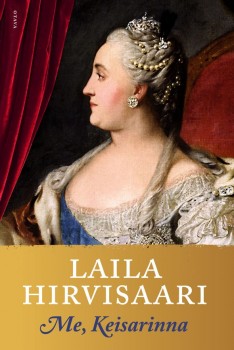 The book year 2013 showed an overall decrease – again: now for the fifth time – in book sales: 2.3 per cent less than in 2012. Fiction for adults and children as well as non-fiction sold 3–5 per cent less, whereas textbooks sold 4 per cent more, as did paperbacks, 2 per cent. The results were published by the Finnish Book Publishers’ Association on 28 January.
The book year 2013 showed an overall decrease – again: now for the fifth time – in book sales: 2.3 per cent less than in 2012. Fiction for adults and children as well as non-fiction sold 3–5 per cent less, whereas textbooks sold 4 per cent more, as did paperbacks, 2 per cent. The results were published by the Finnish Book Publishers’ Association on 28 January.
The overall best-seller on the Finnish fiction list in 2013 was Me, Keisarinna (‘We, tsarina’, Otava), a novel about Catherine the Great by Laila Hirvisaari. Hirvisaari is a queen of editions with her historical novels mainly focusing on women’s lives and Karelia: her 40 novels have sold four million copies.
However, her latest book sold less well than usual, with 62,800 copies. This was much less than the two best-selling novels of 2012: both the Finlandia Prize winner, Is, Jää (‘Ice’) by Ulla-Lena Lundberg, and the latest book by Sofi Oksanen, Kun kyyhkyset katosivat (‘When the doves disappeared’), sold more than 100,000 copies.
The winner of the 2013 Finlandia Prize for Fiction, Riikka Pelo’s Jokapäiväinen elämämme (‘Our everyday life’, Teos) sold 45,300 copies and was at fourth place on the list. Pauliina Rauhala’s first novel, Taivaslaulu (‘Heaven song’, Gummerus), about the problems of a young couple within a religious revivalist movement that bans family planning was, slightly surprisingly, number nine with almost 30,000 copies.
The best-selling translated fiction list was – not surprisingly – dominated by crime literature: number one was Dan Brown’s Inferno, with 60,400 copies.
Number one on the non-fiction list was, also not surprisingly, Guinness World Records with 35,700 copies. Next came a biography of Nokia man Jorma Ollila. The winner of the Finlandia Prize for Non-Fiction, Murtuneet mielet (‘Broken minds’, WSOY), sold 22,600 copies and was number seven on the list.
Eight books by the illustrator and comics writer Mauri Kunnas featured on the list of best-selling books for children and young people, with 105,000 copies sold. At 19th place was an Angry Birds book by Rovio Enterntainment. The winner of the Finlandia Junior Prize, Poika joka menetti muistinsa (‘The boy who lost his memory’, Otava), was at fifth place.
Kunnas was also number one on the Finnish comic books list – with his version of a 1960s rock band suspiciously reminiscent of the Rolling Stones – which added 12,400 copies to the figure of 105,000.
The best-selling e-book turned was a Fingerpori series comic book by Pertti Jarla: 13,700 copies. The sales of e-books are still very modest in Finland, despite the fact that the number of ten best-selling e-books, 87,000, grew from 2012 by 35,000 copies.
The cold fact is that Finns are buying fewer printed books. What can be done? Writing and publishing better and/or more interesting books and selling them more efficiently? Or is this just something we will have to accept in an era when books will have less and less significance in our lives?
On stage in New York
28 May 2010 | In the news
Puhdistus (2007), a play by Sofi Oksanen that also became a award-winning novel (2008), will be produced at the prestigious La MaMa theatre in New York in February 2011 under the title Purge. The director is Zishan Ugurlu, La MaMa’s Artistic Director.
Next month, Purge will be read in Chicago where the conference of the Theatre Communication Group of American professional theatres takes place. In September the play – which is set in 20th-century Estonia – will also be prèmiered in Tartu, Estonia. The novel was published in Estonian translation last year. Purge was published in English this April by Grove/Atlantic, translated by Lola Rogers. So far translation rights have been sold to 28 countries.
The play has been translated into English by Eva Buchwald, dramaturge at the Finnish National Theatre, where Purge was first produced in 2007. No Finnish play has ever before been produced on a professional stage in the US.
Kaiken takana oli pelko. Kuinka Viro menetti historiansa ja kuinka se saadaan takaisin [Fear behind it all. How Estonia lost its history and how it will be recovered]
23 July 2009 | Mini reviews, Reviews
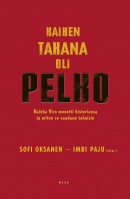 Kaiken takana oli pelko. Kuinka Viro menetti historiansa ja kuinka se saadaan takaisin
Kaiken takana oli pelko. Kuinka Viro menetti historiansa ja kuinka se saadaan takaisin
[Fear behind it all. How Estonia lost its history and how to get it back]
Toim. [Ed. by] Sofi Oksanen & Imbi Paju
Helsinki: WSOY, 2009. 563 p., ill.
ISBN 978-951-0-35111-6
€ 29, hardback
Twentieth-century Estonian history was marked by a brief German occupation (1918) and a Soviet occupation lasting nearly half a century (1940–1991). This book contains more than 30 articles by Finnish, Estonian, Russian, British and American experts in the field, dealing with with subjects that include the propaganda of the Soviet occupation, the methods of political oppression, environmental pollution, corruption and the situation of the arts and culture during the occupation. There are also previously suppressed memoirs and reminiscences by survivors of the Gulag prison camps. Sofi Oksanen (born 1977) is a Finnish writer of Estonian heritage who was awarded the 2008 Finlandia Prize for Fiction for her novel Puhdistus (‘Purge’), which is based on Estonian history. Imbi Paju (born 1959) is an Estonian film director and writer. The book deals with the morality of a totalitarian state in general, and examines how different contries have approached the concept of human rights violations in recent times. It has given rise to much debate about Finland’s relations with neighbouring Estonia and its people.
Is it a play, is it a book?
25 February 2011 | This 'n' that

On the way to fame: Walt the Wonder Boy in Kristian Smeds's stage adaptation of Paul Auster's novel Mr. Vertigo at the Finnish National Theatre (2010). Photo: Antti Ahonen
Dramatisations of novels are tricky. Finnish theatremakers like adapting novels for the stage, which often results in a lot of talking instead of action – and action here doesn’t refer to just physical movement but to the subtext, to what happens under and behind the words.
Currently an adaptation of an American novel is running on the main stage of the Finnish National Theatre in Helsinki. Mr Vertigo (1994), Paul Auster’s seventh book, tells the story of an orphan boy in the 1930s St Louis. After harsh years as the long-suffering apprentice of the mysterious Master Yehudi, Walt becomes the sensational Wonder Boy by learning how to levitate.
In theatremaker Kristian Smeds’s adaptation, Auster’s whimsical, rambling novel becomes a capricious, illusory journey about illusions, freedom, and the unattainability of love. Walt (the highly expressive, athletic Tero Jartti) interprets, with hilarious comedy as well as with touching desperation, both the dizzyingly powerful experience of creativity and the ridiculous hubris of the artist. More…
A respectable tragedy
30 June 1988 | Archives online, Fiction, Prose
An extract from the novel Säädyllinen murhenäytelmä (‘A respectable tragedy’, 1941). Introduction by Kaija Valkonen. The central theme of the novel is love: young, old, passionate, innocent, proper, improper. The main characters are a middle-aged couple, the doctor and his wife Elisabet, his sister Naimi and the love of her youth, Artur. Hämäläinen’s fine irony, careful and thoughtful psychology and colourful language have made the novel a bestseller. Naimi, an aesthete and an uncompromising character, has left her husband Artur twenty years ago because of his infidelity. But slowly she begins to forgive: this tragic but compassionately told love story, not without tragicomedy and humour, ends in reconciliation
Embalmed passion
In that new Helsinki of the ‘thirties, which had opened like a garden flower, gaily coloured, sunlit, practical and impractical, in love with every novelty of the moment, which it thought astonishing, lived Naimi Saarinen, back from her exile, where she had been driven by wounded passion twenty years before. More…
Finlandia Prize for Fiction candidates 2012
23 November 2012 | In the news
The candidates for the Finlandia Prize for Fiction 2012 were announced on 15 November. They are Riikka Ala-Harja, Pirjo Hassinen, Heidi Köngäs, Ulla-Lena Lundberg, Aki Ollikainen and Juha Seppälä.
Their novels, respectively, are Maihinnousu (‘The landing’, Like), Popula (Otava), Dora, Dora (Otava), Is (‘Ice’, Schildts & Söderströms), Nälkävuosi (‘The year of hunger’, Siltala) and Mr. Smith (WSOY).
The jury – researcher Janna Kantola, teacher of Finnish Riitta Kulmanen and film producer Lasse Saarinen – made their choice out of ca. 130 novels. The winner, chosen by Tarja Halonen, who was President of Finland between 2000 and 2012, will be announced on 4 December. The prize, awarded since 1984, is worth 30,000 euros.
The jury’s chair, Janna Kantola, commented: ‘One of this year’s recurrent themes is the Lapland War [of 1944–1945]. Writers appear to be pondering the role of Germany in both the Second World War and in contemporary Europe. Social phenomena are examined using satire; the butt is the birth and activity of extremist political movements. Economics, the gutting of money and market forces, are present, as in previous years, but now increasingly with a sense of social responsibility.’
Popula deals with people involved in a contemporary populist political party. Dora, Dora describes Albert Speer’s journey to Finnish Lapland in 1943. Nälkävuosi depicts the year of hunger in Finland, 1868. Is takes place in the Finnish archipelago of the post-war years. Mr. Smith portrays greed and the destructive power of money both in Russian and Finnish history as well as in contemporary Finland. Maihinnousu, set in Normandy, depicts a child’s serious disease in a family that is going through divorce.


